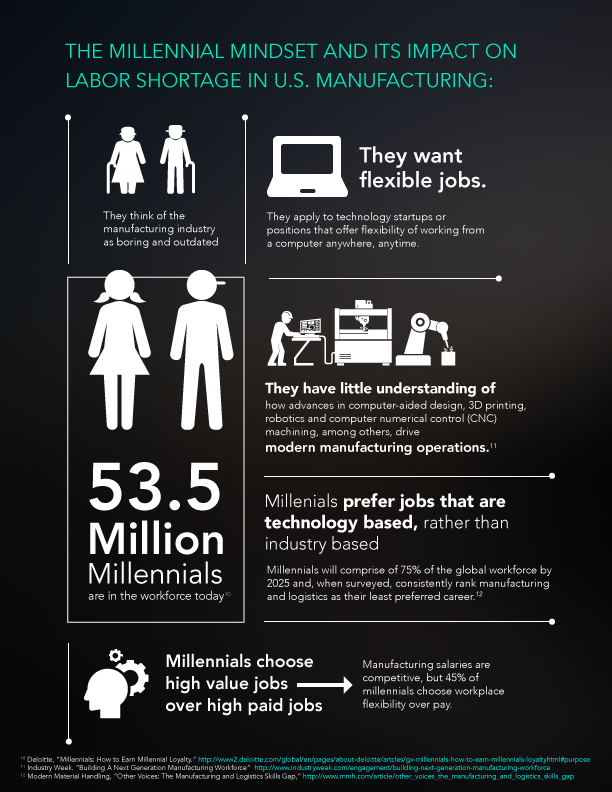28 Aug Labor shortage. Millennials and the future. Click to keep reading…
Employers all over the country are struggling to find qualified job candidates. Many of our principals find it very challenging to find quality people for all different types of manufacturing positions. As the economy continues to grow and companies are trying to increase productivity to keep up with demand, the biggest concern is not new technologies (automation or robotics) and/or equipment, but lack of skilled workers.
Two parallel Studies, “The Skills Gap in U.S. Manufacturing: 2015 and Beyond,” and, “Deloitte and the Manufacturing Institute,“ draw perspectives from U.S. manufacturing executives to reveal that American manufacturing companies will face a significant skills gap over the next decade. This is largely fueled by baby boomer retirement and too few young people who see the industry as an appealing career.
“The research shows that 84 percent of manufacturing executives agree there is a talent shortage in U.S. manufacturing, and the gap will be exacerbated by more than 3.5 million professionals exiting the manufacturing workforce through retirement over the next 10 years and 2 million of those jobs are likely to go unfilled due to the skills gap.”
Are Millennials the Future of manufacturing labor?
This chart illustrates the lack of interest from the next generation of workers – millennials!

Deloitte. “Millennials: How to earn millennial loyalty.”
What is very interesting to me is that millennial’s are choosing high value jobs over high paid jobs. Flexibility over pay!
What is the solution to the Labor Shortage?
The cost of labor worldwide, and the growing challenges with the labor shortages, are rapidly impacting our industry. Does new technology unlock new solutions to the labor cost and shortages?
“Roughly eight in ten manufacturing executives (82 percent) feel that workforce shortages or skills deficiencies in production roles have a significant impact on their ability to meet customer demand, and 78 percent indicate that it impacts their ability to implement new technologies and increase productivity. Manufacturing executives responding to the skills gap survey indicated that six of every ten skilled production openings they have are unfilled today due to the talent shortage.”
“While 80 percent of executives report they are willing to pay higher salaries than the market rates in workforce areas reeling under the talent crisis, the industry appears to suffer from an inability to fill positions expeditiously. The manufacturing executives surveyed report that it takes more than 90 days to recruit highly skilled workers such as engineers and scientists, and an average of 70 days to recruit skilled production workers.”
“Traditional past practices and methods used for recruiting and developing workers needed for the future of manufacturing are simply not going to be adequate,” said Benjamin Dollar, Deloitte Consulting principal and co-author of the studies.
As you can see there are no simple answers to this shortage. –Commentary provided by Greg Johnson.






No Comments